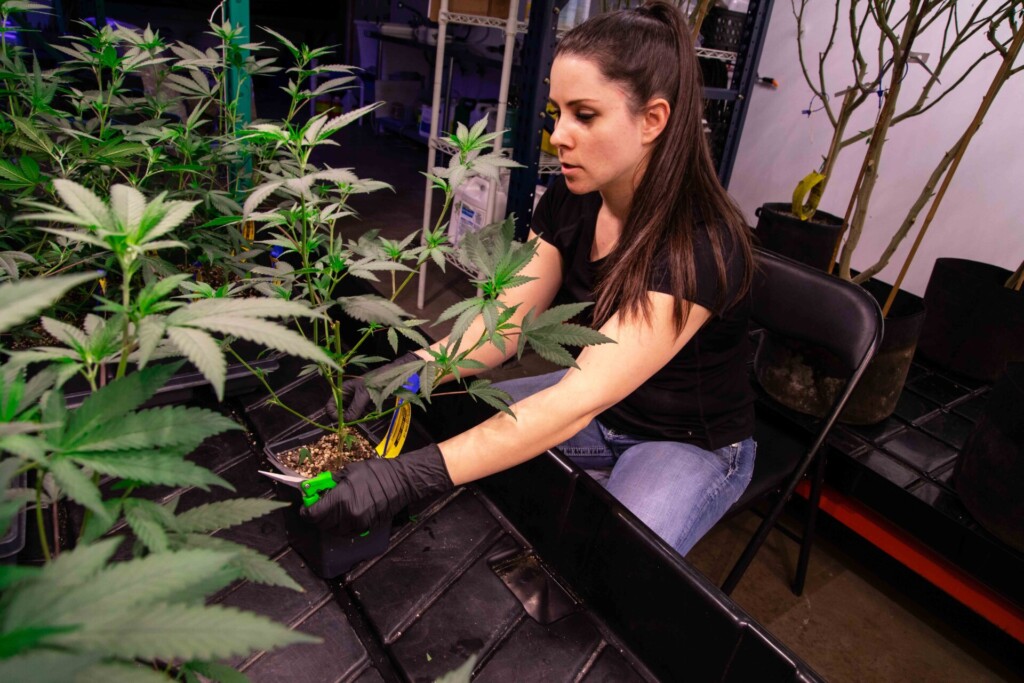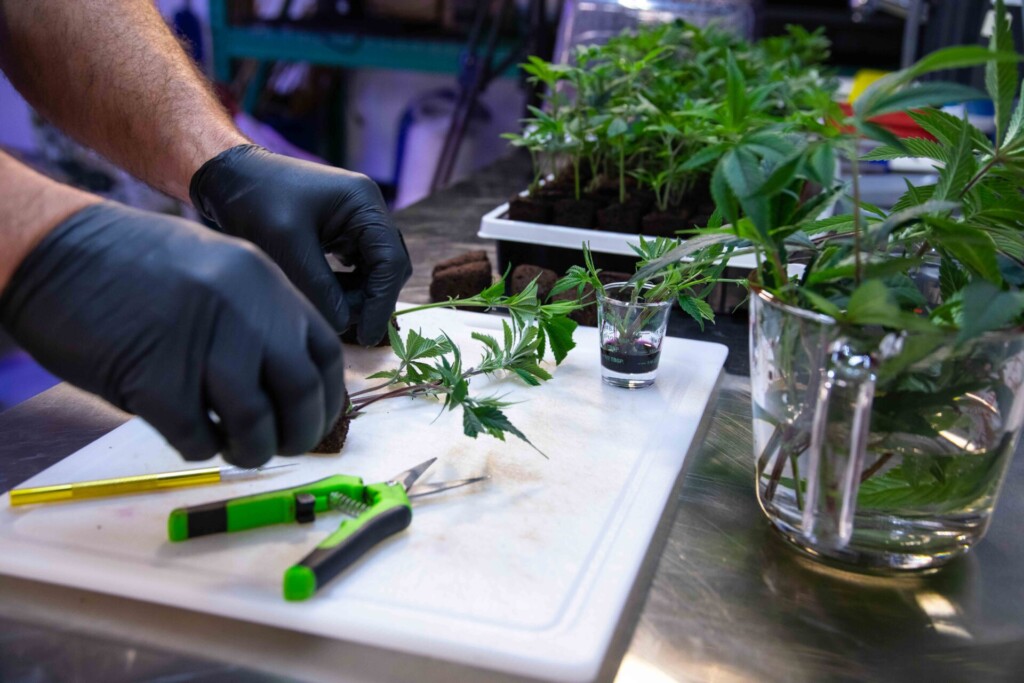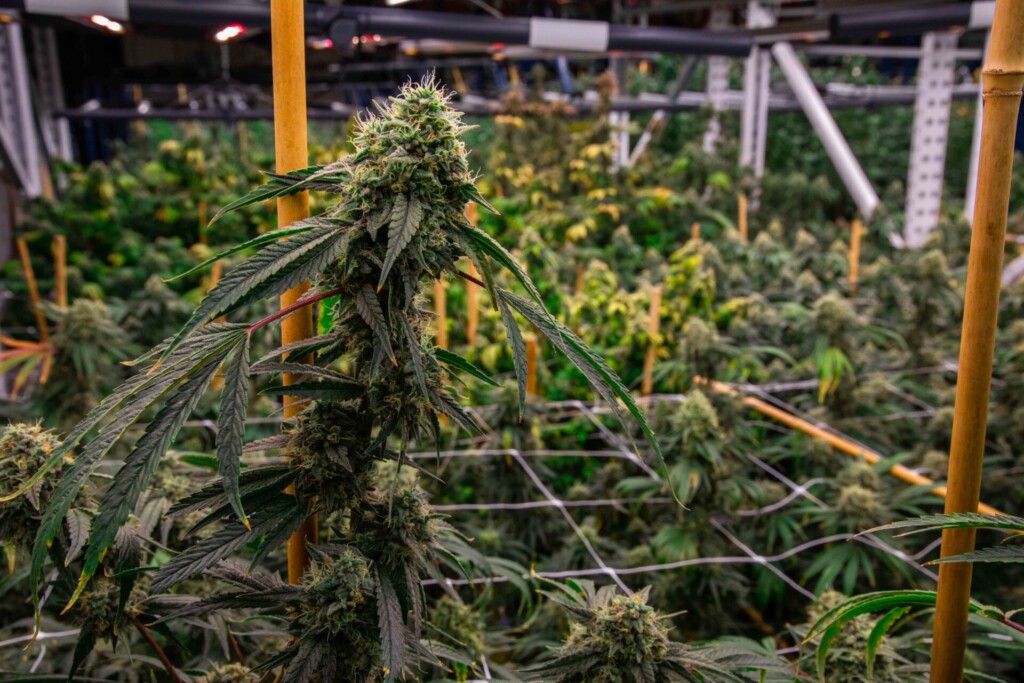Why organic cannabis makes the best medicine
Here at Rocking Star Farm, we grow organic medicinal cannabis through safe, natural farming processes. Why? We’re focused on patient outcomes, and organic cannabis simply makes the best medicine.
According to RSF owner Sam Bein, “we want to make a natural product. We’re focused on the health of the patients and what they’re putting in their body.”
The true cost of chemicals
“If we were solely focused on financial gain, that would have influenced the types of pesticides, herbicides, fertilizers, and soil we used,” says Sam. “It can be tempting to cut corners, but that would be putting harmful chemicals into patients’ systems.”
Sam explains that while cheap chemical might save money in the short-term, there’s a long-term cost in quality and outcomes. Especially whenever non-organic cannabis is processes into distillates and extracts, those harmful compounds are actually concentrated down along with the beneficial THC, CBD, and terpenes. Toxin residue levels that were passable in plant form might suddenly become extremely harmful, or even lethal.
Going organic
Utilizing natural growing practices isn’t cheap, but according to Sam, it’s well worth it. “We spend three to five times more on our materials to make sure that they are organic, natural, and safe. We’re creating a medicine, so we want to make sure we’re always patient focused.”

Young cannabis plants are transferred into larger containers. RSF’s indoor environment is carefully controlled to promote growth and reduce harmful microbials like molds and spores.
Growing organic doesn’t mean that the plants are simply left to their own devices. Especially in indoor grow facilities, environmental control is still of utmost importance. Warm, humid conditions aren’t just good for plants, they are also good for harmful mildew, mold, and spores. All medicinal cannabis products must pass stringent microbial tests.
“These microbials are everywhere,” explains Sam. “Every time you open the door, they are floating in, and we have to control that. We try to eliminate the conditions that allow those to grow.”
Rocking Star Farm accounts for these foreign invaders with top-of-the-line air and water purification systems and strict cleaning regimens. (And even the cleaning chemicals sprayed on floors and surfaces around plants are food grade.)
Sam says, “We’re always cleaning…It never ends, but that’s what you have to do to create a premium quality product.”
When the team does use bio sprays and fungicides, they are always OMI certified, meaning they are still acceptable within an organic growing program. The farm’s pest management program is also tightly controlled according to industry best practices for organic growing.
“A lot of research and testing went into finding products that are safe for the plant and the patient,” says Sam. “That’s our first priority.”

New clones are prepared in the nursery. Everything at Rocking Star Farm is constantly, meticulously cleaned to prevent contamination and create the highest quality medicinal products.
Sustainable farming practices
Farming at RSF isn’t just organic, it’s also sustainable. Wherever possible, the farm conserves resources and reduces waste.
“Our industry can be very dirty,” shares Sam, “But we’re a small locally-owned operation, and whenever we can, we’re going to try to do what’s best for our community and for our planet. The land has been good to many generations of farmers here in Inola, Oklahoma, and it’s our privilege to take care of that land for future generations too.”
Agricultural Wastewater Reclamation
Sustainability first comes in the form of agricultural wastewater recycling. Medical marijuana farms need lots of water for irrigation, cleaning, and flushing. Even the powerful HVAC systems pull water from the humid air that can be recycled. All of this wastewater at RSF goes into two 1000-gallon tanks from which it can be reclaimed by a state-of-the-art water treatment system.
RSF’s system doesn’t actually utilize a reverse-osmosis (RO) process. Instead, it is a finely-tuned filtration and purification system that allows full control over the minerals and nutrients in the water.
“Reverse Osmosis has about 30-40% water loss,” explains Sam, “and on top of that, it strips out everything in the water—good or bad. Our system only has about 10% loss, and it allows us to control micro-nutrients down to parts per million. If we want to keep 50 ppm of calcium in the water, we can do that.”
RSF is thinking creatively when it comes to other forms of waste too. “We recycle all of our pots and soil by donating to community farmers who are growing traditional crops and vegetables,” says Sam. “We’re always asking ‘how can we improve?’ ‘how do we give back?’”

Creative planning and careful construction reduce energy costs at the farm by up to 70% compared to traditional grow facilities.
Energy Conservation
In an increasingly power-hungry industry, RSF stands apart.
Out purpose-built grow facility was designed from the ground up to be extremely energy efficient. The entire building is insulated and sealed as a closed system. Hardware was specifically chosen for reduced electrical usage and thermal efficiency. State-of-the-art heating and cooling systems, lighting, dehumidifiers, and more all add up to 70% energy reduction from a traditional grow.
“Our farm has been here since before State Question 788,” shares Sam. “It’s always been my dream to provide for my family off my land. We’ve been working to this point for the last 25 years and have been involved in the Inola community since 2000, through the Oklahoma Livestock Association, Oklahoma Farmers and Ranchers, and other groups. We’re here to stay, and we want to help Inola grow and improve for everybody. We’re not just here to serve ourselves, we’re here to serve the community. I believe that’s what it really means to be a true local business.”


